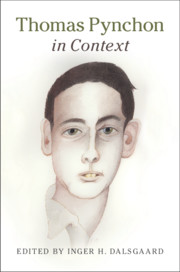Book contents
- Thomas Pynchon in Context
- Thomas Pynchon in Context
- Copyright page
- Contents
- Contributors
- Abbreviations
- Chronology
- Introduction
- Part I Times and Places
- Part II Culture, Politics, and Society
- Chapter 14 Family
- Chapter 15 Sex and Gender
- Chapter 16 Humor
- Chapter 17 Popular Culture
- Chapter 18 Music and Sound
- Chapter 19 Film and Television
- Chapter 20 Real Estate and the Internet
- Chapter 21 Politics and Counterculture
- Chapter 22 Drugs and Hippies
- Chapter 23 Ecology and the Environment
- Chapter 24 Capitalism and Class
- Chapter 25 War and Power
- Chapter 26 Conspiracy and Paranoia
- Chapter 27 Terror and Anarchy
- Chapter 28 Science and Technology
- Chapter 29 Mathematics
- Chapter 30 Time and Relativity
- Chapter 31 Philosophy
- Chapter 32 Religion and Spirituality
- Chapter 33 Death and Afterlife
- Part III Approaches and Readings
- Further Reading
- Index
Chapter 23 - Ecology and the Environment
from Part II - Culture, Politics, and Society
Published online by Cambridge University Press: 31 May 2019
- Thomas Pynchon in Context
- Thomas Pynchon in Context
- Copyright page
- Contents
- Contributors
- Abbreviations
- Chronology
- Introduction
- Part I Times and Places
- Part II Culture, Politics, and Society
- Chapter 14 Family
- Chapter 15 Sex and Gender
- Chapter 16 Humor
- Chapter 17 Popular Culture
- Chapter 18 Music and Sound
- Chapter 19 Film and Television
- Chapter 20 Real Estate and the Internet
- Chapter 21 Politics and Counterculture
- Chapter 22 Drugs and Hippies
- Chapter 23 Ecology and the Environment
- Chapter 24 Capitalism and Class
- Chapter 25 War and Power
- Chapter 26 Conspiracy and Paranoia
- Chapter 27 Terror and Anarchy
- Chapter 28 Science and Technology
- Chapter 29 Mathematics
- Chapter 30 Time and Relativity
- Chapter 31 Philosophy
- Chapter 32 Religion and Spirituality
- Chapter 33 Death and Afterlife
- Part III Approaches and Readings
- Further Reading
- Index
Summary
Thomas Pynchon’s “A Journey Into The Mind of Watts” (1966) describes the neighborhood as “a pocket of bitter reality.” In terms of natural landscape, reality apparently offers little: The closest measure of wilderness is found in derelict spaces “charred around the edges” and covered in “glass, busted crockery, nails, tin cans, all kinds of scrap and waste.” Although nature is a locus of value in Pynchon’s fictions, it is usually marked by the detritus of violence and indifference. However, one must weigh against that marred nature one even less appealing: While the littered terrain of “bitter reality” is still reality, most of Greater LA offers only “plastic faces” and “Disneyfied landscaping.” As the bifurcated world presented in the article suggests, Pynchon’s narratives of general decline make clear the inaccessibility of any bucolic paradise. There are, however, exceptions to this rule, and they are among the most beautiful and inspiring passages in his texts. These moments indicate the importance of nature to our best aspirations, and allow glimpses of an alternative to “the bare mortal World that is our home, and our Despair” (MD 345). Furthermore, Pynchon’s most recent novels suggest that, as our experience of the world becomes increasingly mediated by virtual technologies, new, digital, ecologies may offer computer-age equivalents to Simon Rodia’s Watts Towers, visionary constructions that make beauty of waste and open avenues for voicing that which is silenced – possibly including the life of the natural world.
- Type
- Chapter
- Information
- Thomas Pynchon in Context , pp. 187 - 194Publisher: Cambridge University PressPrint publication year: 2019
- 1
- Cited by



